Overview
Cost savings in Latin America research are primarily driven by:
- Reduced labor costs
- Lower operational expenses
- Streamlined regulatory processes
These factors enable substantial savings that can exceed 30%. The article underscores how partnerships with local contract research organizations and advancements in infrastructure significantly enhance these savings. Consequently, this makes the region an attractive option for conducting clinical studies.
Introduction
In the rapidly evolving landscape of clinical research, Latin America emerges as a beacon of opportunity, particularly for Medtech companies seeking cost-effective solutions. With the potential for significant savings—often exceeding 30% compared to North America and Europe—this region is transforming into a preferred destination for clinical trials.
The convergence of lower labor costs, streamlined regulatory processes, and innovative collaborations with local contract research organizations (CROs) is reshaping the way studies are conducted. As advancements in infrastructure and technology continue to bolster the capabilities of CROs, understanding the financial dynamics at play becomes essential for organizations aiming to maximize their research budgets while ensuring high-quality outcomes.
Understanding Cost Savings in Latin American Clinical Research
Cost savings in Latin America research are paramount, particularly in South America, where the expenses associated with studies can be significantly lower than those in North America or Europe. Key factors driving these cost savings include:
- Reduced labor costs
- Lower operational expenses
- More streamlined regulatory processes
Research indicates that conducting medical studies in this region can yield substantial cost savings, exceeding 30%.
In 2025, the financial landscape of medical studies in South America continues to evolve, with patient recruitment costs ranging from $15,000 to $50,000, showcasing the economic advantages of conducting research in Latin America. This cost efficiency is further amplified by the strategic partnerships that Medtech companies can forge with local contract research organizations (CROs) such as bioaccess®. For instance, bioaccess™ has teamed up with Caribbean Health Group to position Barranquilla as a leading hub for research studies in South America, a decision supported by Colombia's Minister of Health.
As Patricio Ledesma, Head of Clinical Operations and Founder at Sofpromed CRO, articulates, "I am personally and enthusiastically devoted to assisting biotech Chief Executive, Operations, Scientific, Medical, and Regulatory Officers in the planning and execution of phase I-IV trials across various regions, including South America." These collaborations not only enhance financial resources but also provide access to diverse patient populations, crucial for achieving robust health outcomes and realizing cost savings in Latin America research.
Moreover, advancements in infrastructure and technology within the region bolster the capabilities of CROs, establishing them as vital partners in global research trials that contribute to cost savings in Latin America research. The expertise of bioaccess® in managing a variety of studies—including Early-Feasibility, First-In-Human, Pilot, Pivotal, and Post-Market Follow-Up Studies—underscores their commitment to innovation and regulatory excellence. As highlighted in the case study titled "Conclusion: The Role of American CROs in Clinical Research," the strategic advantages of collaborating with American CROs enable Medtech companies to accelerate development timelines while fostering economic growth and healthcare enhancements in the region.
This encompasses job creation and improvements in healthcare access and quality. Understanding these financial dynamics is crucial for Medtech companies aiming to achieve cost savings in Latin America research while optimizing their funding without compromising the quality of trials.
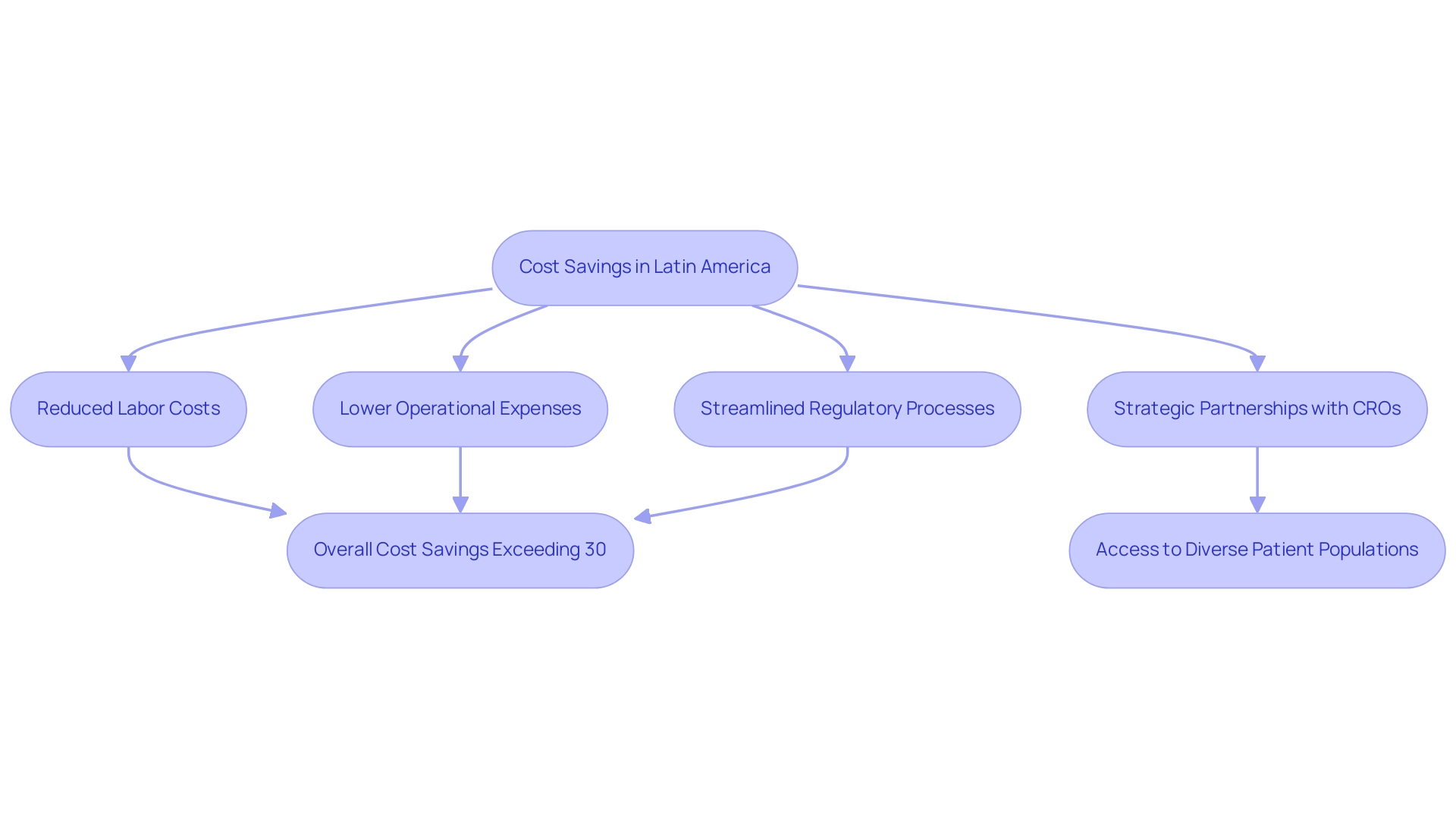
The Evolving Clinical Research Infrastructure in Latin America
In recent years, Latin America has made remarkable strides in enhancing its healthcare investigation infrastructure, establishing specialized centers and refining regulatory frameworks. Nations like Brazil and Mexico are at the forefront of this transformation, directing significant investments into their development capabilities. This dedication not only enhances the quality of research studies but also leads to cost savings in Latin America research by greatly decreasing the time and expenses related to execution.
For instance, Brazil has implemented new laws designed to simplify the approval procedure for medical studies, enabling faster commencement of investigative activities. This legislative shift is crucial, as it addresses one of the primary challenges faced by researchers—lengthy approval timelines. The effect of these enhancements is evident; collaborative networks, such as the partnership between bioaccess® and Caribbean Health Group, have shown substantial decreases in recruitment durations and better retention rates, contributing to cost savings in Latin America research while boosting the overall efficiency of trials in the region.
Significantly, the partnership with Global Care Clinical Trials has achieved over a 50% reduction in recruitment time and 95% retention rates in studies, demonstrating the cost savings in Latin America research and the effectiveness of these initiatives.
Furthermore, specialized study centers in Brazil and Mexico are emerging as key contributors in the medical investigation landscape. These centers not only offer cutting-edge facilities but also promote innovation and teamwork among scientists, further strengthening the region's status as a competitive participant in the global medical study field. As bioaccess® leverages its 20+ years of experience in Medtech, focusing on Early-Feasibility Studies, First-In-Human Studies, Pilot Studies, Pivotal Studies, and Post-Market Clinical Follow-Up Studies, it plays a crucial role in navigating this evolving landscape.
As Vivienne van der Walle, Founder and Medical Director, aptly stated, "Anything that takes away time from patients is a pain point for a site, and anyone who resolves that is helping patient care." As the area continues to adopt patient-focused methods and innovative approaches, the future of medical research in Latin America appears promising, with aspirations of becoming a prominent center for studies by 2025. Moreover, the economic impact of Medtech research studies on local economies—including job creation, healthcare improvement, and cost savings in Latin America research—highlights the significance of these advancements for the region's growth.
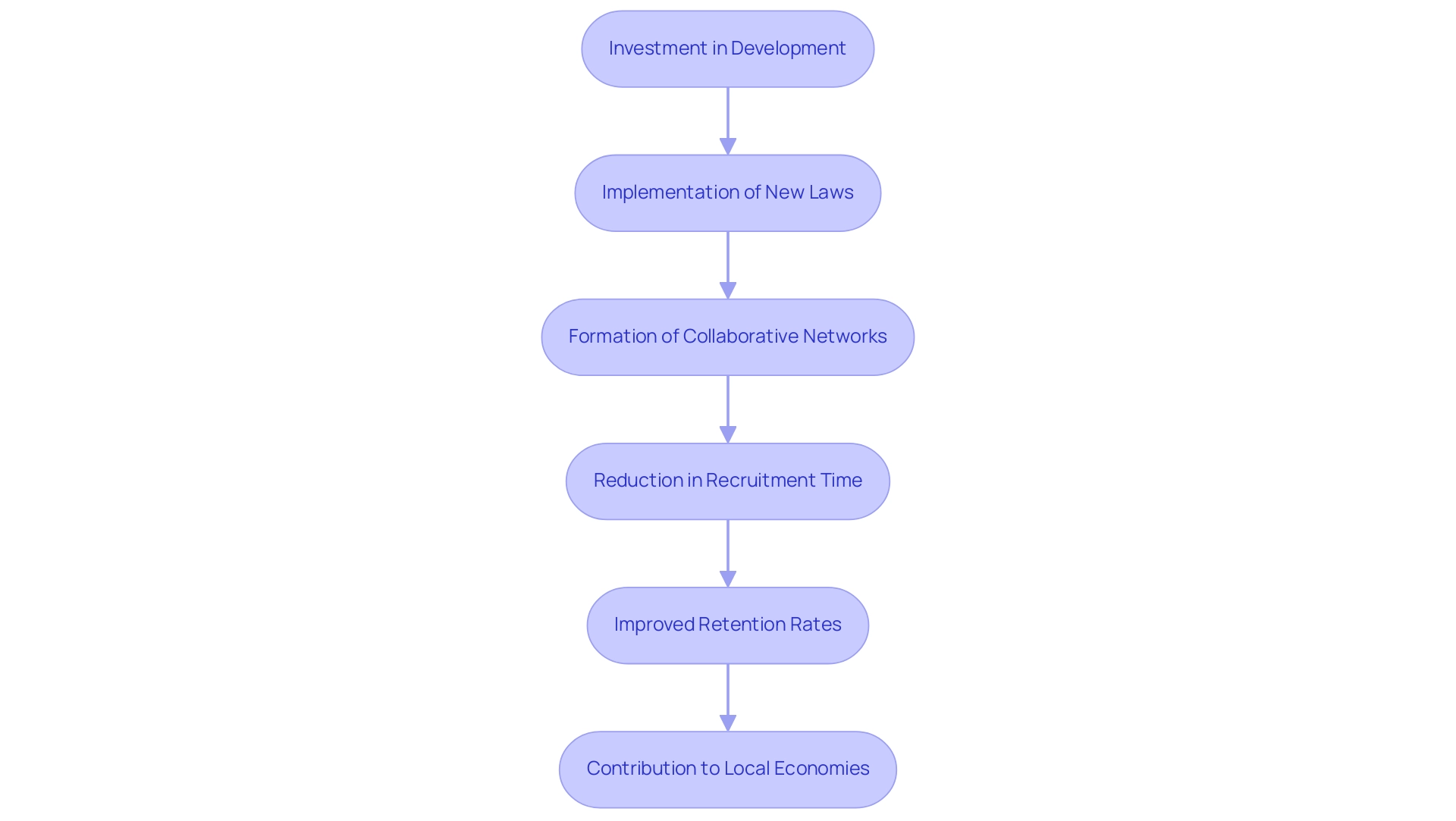
Enhancing Cost Efficiency Through Patient-Centric Clinical Trials
Implementing patient-focused approaches in research studies is essential for achieving cost savings in Latin America research. By prioritizing the needs and preferences of participants, researchers can significantly boost recruitment rates and minimize dropout rates. The integration of digital tools for patient engagement—such as mobile applications that provide reminders and facilitate feedback—enhances communication and adherence to study protocols. This not only creates a more positive experience for participants but also reduces the financial burden associated with recruitment and retention.
With over 20 years of experience in the Medtech sector, bioaccess® acknowledges that by 2025, the effect of these digital tools on recruitment for studies will become increasingly apparent. Research indicates that patient-focused strategies can contribute to cost savings in Latin America research, resulting in a decrease in overall study expenses. A significant case analysis involving GlobalCare Clinical Trials demonstrates this point; their collaboration with bioaccess® in Colombia led to an impressive reduction in subject recruitment time by over 50% and an enhancement in subject retention rates of over 95%.
By capturing a broader range of outcomes through enhanced engagement, researchers can achieve more convincing results, thereby increasing the statistical power of their findings. The GPC analysis, which incorporates medically relevant information, further supports this by leading to more robust results in trials. Rosana Felice, Chief Medical Officer, emphasizes this point, stating, "Thanks, Basia Coulter, Ph.D., for this extraordinary analysis of cost-cutting opportunities in medical development." These types of solutions will enable faster access to innovative medicines. This shift towards a more patient-centered approach not only aligns with the changing environment of medical studies but also highlights the importance of cost savings in Latin America research within the Medtech sector.
bioaccess® provides a variety of services, including:
- Early-Feasibility Studies (EFS)
- First-In-Human Studies (FIH)
- Pilot Studies
- Pivotal Studies
- Post-Market Follow-Up Studies (PMCF)
to support research in South America.
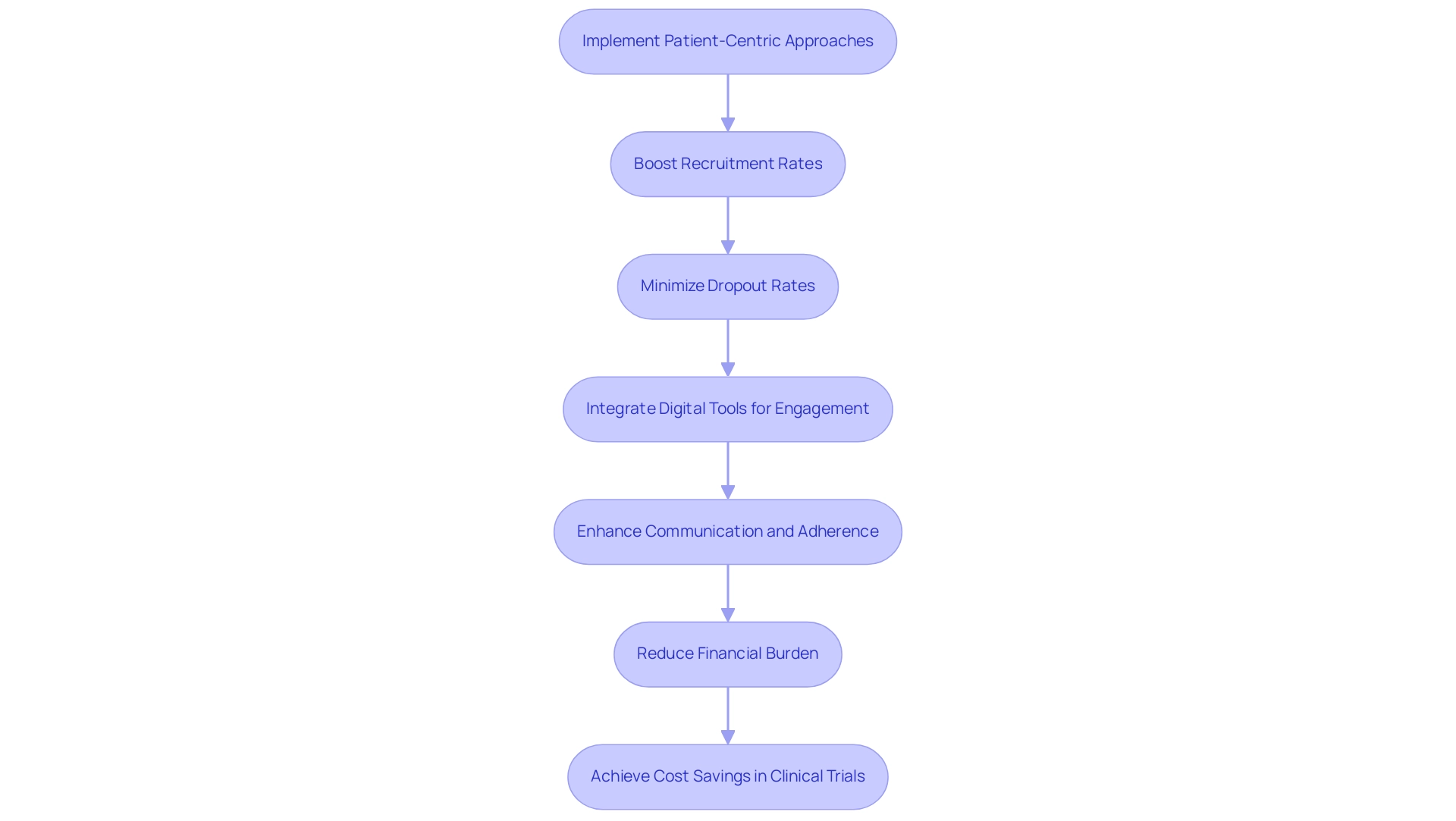
Decentralized Clinical Trials: A Cost-Effective Approach
Decentralized medical studies (DCTs) are rapidly emerging as a cost-efficient strategy within the medical investigation domain, particularly yielding significant cost savings in Latin America research. By enabling participants to engage in studies from the comfort of their homes, DCTs substantially diminish the necessity for extensive travel and reduce site-related expenses. This innovative model not only enhances patient access but also accelerates recruitment timelines, rendering it especially beneficial for the diverse populations of the region. Recent analyses indicate that cost savings in Latin America research can achieve operational cost reductions ranging from 10% to 25%, primarily through decreased site fees and minimized patient travel costs.
A compelling case study titled 'Cost and Time Savings from DCTs' highlights that these studies not only enhance patient involvement but also demonstrate cost savings in Latin America research, making them an appealing choice for healthcare organizations. Furthermore, a survey revealed that 94% of patients expressed a readiness to utilize mobile applications for participation in research studies, underscoring the potential for enhanced engagement and diversity among participants.
As the region increasingly adopts this decentralized approach, it is poised to emerge as a leader in effective research study implementation. The transition towards DCTs streamlines processes while fostering greater inclusivity, allowing for broader representation of patient demographics. This evolution in healthcare research methodology positions the region as an attractive destination for Medtech companies aiming to conduct studies that exemplify cost savings in Latin America research while remaining both cost-effective and accessible.
In this context, bioaccess™ distinguishes itself as a premier Contract Research Organization (CRO) facilitating medical device research in South America. Their comprehensive research study management services encompass feasibility assessments, site selection, compliance evaluations, setup, import permits, project oversight, and reporting. Notably, bioaccess™ has collaborated with Caribbean Health Group to establish Barranquilla as a leading location for research studies in Latin America, supported by Colombia's Minister of Health.
This partnership aspires to bolster the local economy through job creation, economic growth, and enhanced healthcare outcomes.
Additionally, GlobalCare Clinical Studies has joined forces with bioaccess™ to optimize study ambulatory services in Colombia, achieving over a 50% reduction in recruitment time alongside impressive 95% retention rates. As Patricio Ledesma, Head of Clinical Operations and Founder at Sofpromed CRO, articulates, he is personally dedicated to assisting biotech companies navigate the complexities of studies, highlighting the critical role of DCTs in advancing medical innovations. Furthermore, testimonials from stakeholders engaged in these initiatives accentuate the positive impact of bioaccess™'s services on local healthcare systems and economies.
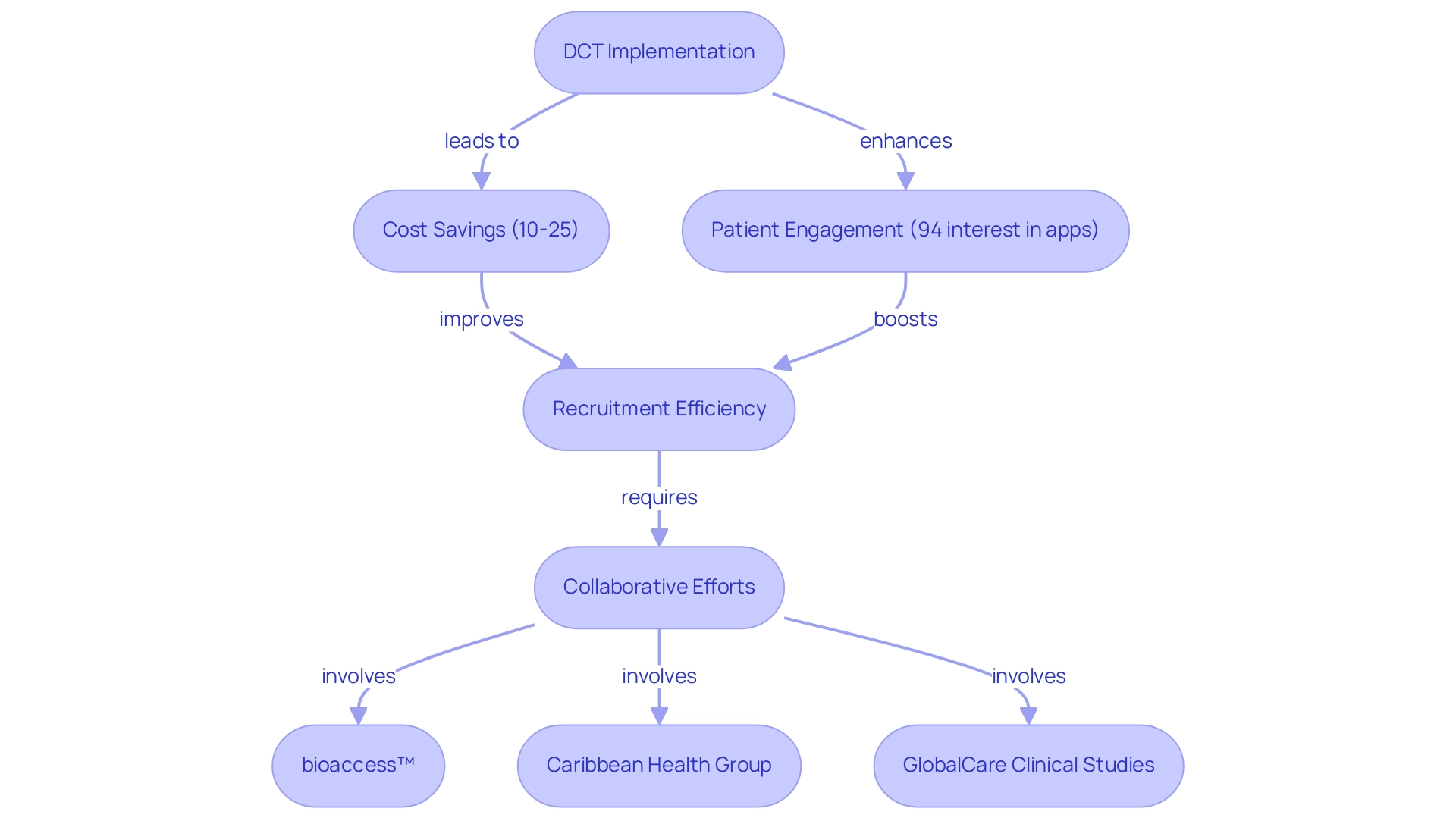
Navigating Regulatory Advancements for Cost-Effective Research
Recent regulatory advancements in Latin America have significantly streamlined the approval processes for studies, facilitating a more efficient initiation of investigations. Notably, the alignment of regulatory standards across different nations has led to a considerable decrease in approval durations, which have traditionally posed a major obstacle to execution. This alignment not only minimizes delays but also results in cost savings for research in Latin America, ultimately enhancing overall research efficiency.
In 2025, the research sector in the Andean Region of South America experienced a remarkable increase in yearly funding, soaring from $3-4 million to over $50 million. This influx of resources underscores the growing recognition of the area's potential for conducting medical studies. Furthermore, with approximately 30% of the population in South America under the age of 14, there exists a burgeoning market for new medical innovations, particularly as the elderly population continues to grow, creating a significant demand for new treatments.
bioaccess®, with over 20 years of expertise in Medtech, stands at the forefront of this evolution, offering comprehensive study management services that include:
- Early-Feasibility Studies (EFS)
- First-In-Human Studies (FIH)
- Pilot Studies
- Pivotal Studies
- Post-Market Follow-Up Studies (PMCF)
The case study titled "Future Perspectives on Clinical Trials in Latin America" emphasizes the necessity for enhanced infrastructure and collaboration among stakeholders to achieve cost savings in research and optimize resources in medical research. bioaccess® is uniquely positioned to foster these partnerships, ensuring that Medtech firms can effectively navigate the intricacies of research studies.
As Vivienne van der Walle, Founder and Medical Director, states, "Anything that takes away time from patients is a pain point for a site, and anyone who resolves that is helping patient care." By leveraging streamlined approval processes and bioaccess's extensive experience, researchers can navigate the complexities of trial processes more effectively, ensuring that innovative medical devices reach the market sooner and benefit patients in need.
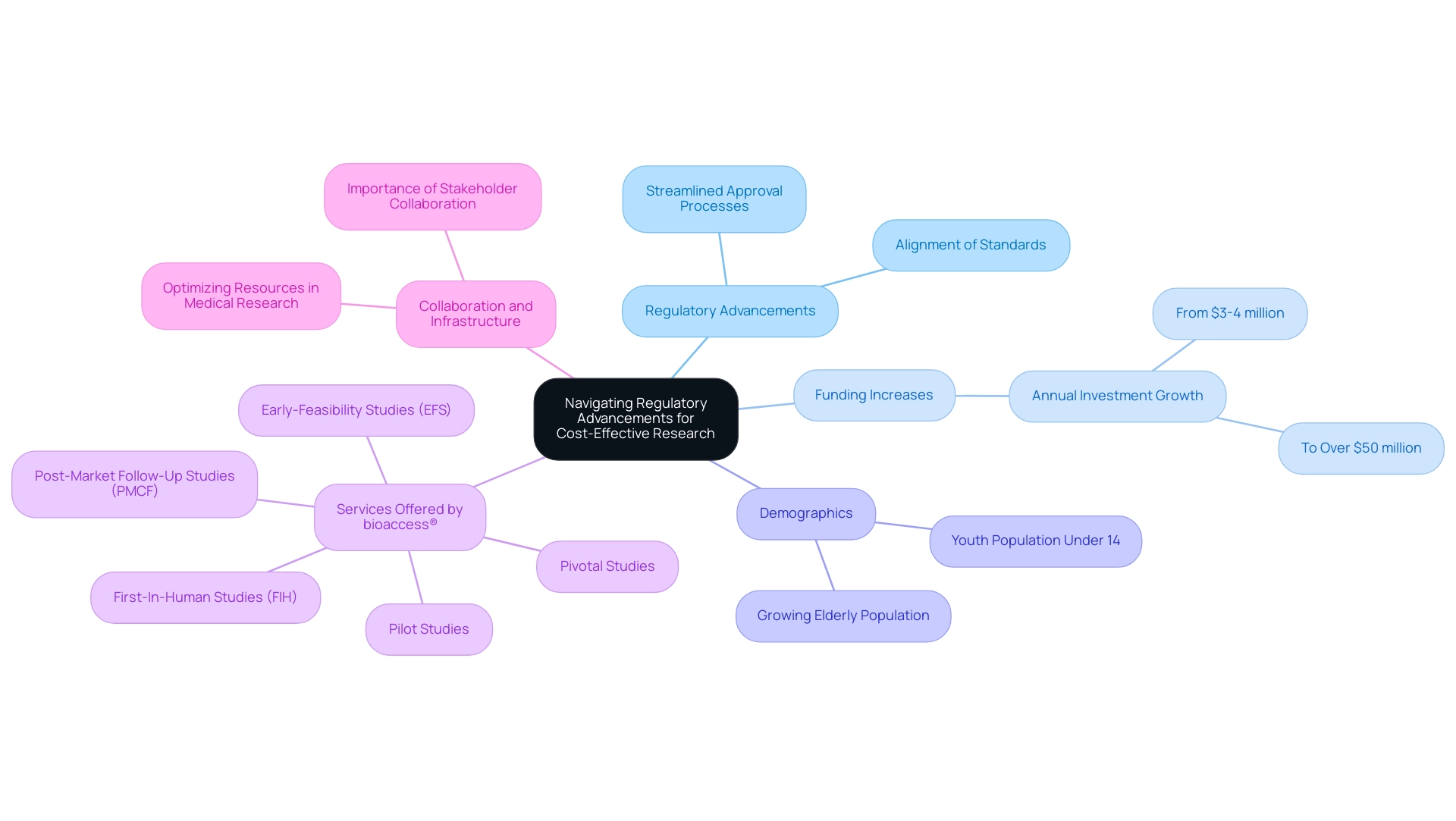
Leveraging Collaborations for Cost Savings in Research
Forming strong partnerships among stakeholders in the healthcare ecosystem is crucial for realizing significant cost reductions. By establishing strategic alliances with contract study organizations (CROs), academic institutions, and other investigative entities, companies can effectively share resources, expertise, and infrastructure. This collaborative approach minimizes redundancy and streamlines processes, leading to a substantial reduction in operational costs.
For instance, bioaccess™ has partnered with Caribbean Health Group (CHG) to position Barranquilla as a leading site for trials in Latin America, supported by Colombia's Minister of Health. This collaboration aims to enhance the medical investigation environment in the region, making it more attractive for international studies. Medical device firms are increasingly evaluating site experiences by monitoring data entry speeds and optimizing query processes for trial associates (Cras).
A notable case is Alcon, which reported that 45% of its data is entered on the same day as the visit date, showcasing the efficiency gained through improved site collaboration. As Leianne Ebert, Head of Clinical Data Operations at Alcon, stated, "This is something we monitor regularly, and last week, our records showed that 45% of our data is entered on the same day as the visit date." Such enhancements in site experience not only expedite data entry but also allow sites to concentrate more on patient interactions, ultimately improving patient care.
Furthermore, collaborations can elevate the quality of studies by integrating diverse perspectives and skills, fostering innovation in medical evaluations. As the landscape of medical studies evolves, particularly with the anticipated adoption of blockchain technology by 2025 to enhance data security and transparency, the significance of partnerships will become increasingly vital. In the context of Latin America, bioaccess® is uniquely positioned to facilitate these partnerships, assisting stakeholders in navigating the complexities of studies while ensuring cost savings in Latin American research and maintaining high standards of integrity.
With over 20 years of experience in managing diverse projects, including Early-Feasibility Studies, First-In-Human Studies, Pilot Studies, Pivotal Studies, and Post-Market Follow-Up Studies, bioaccess® serves as a trusted CRO and consulting partner for U.S. medical device firms in Colombia, ensuring favorable outcomes in trials. Dushyanth Surakanti, Founder and CEO of Sparta Biomedical, shared his positive experience with bioaccess® during its initial human study in Colombia, underscoring the company's commitment to excellence and innovation in medical exploration.
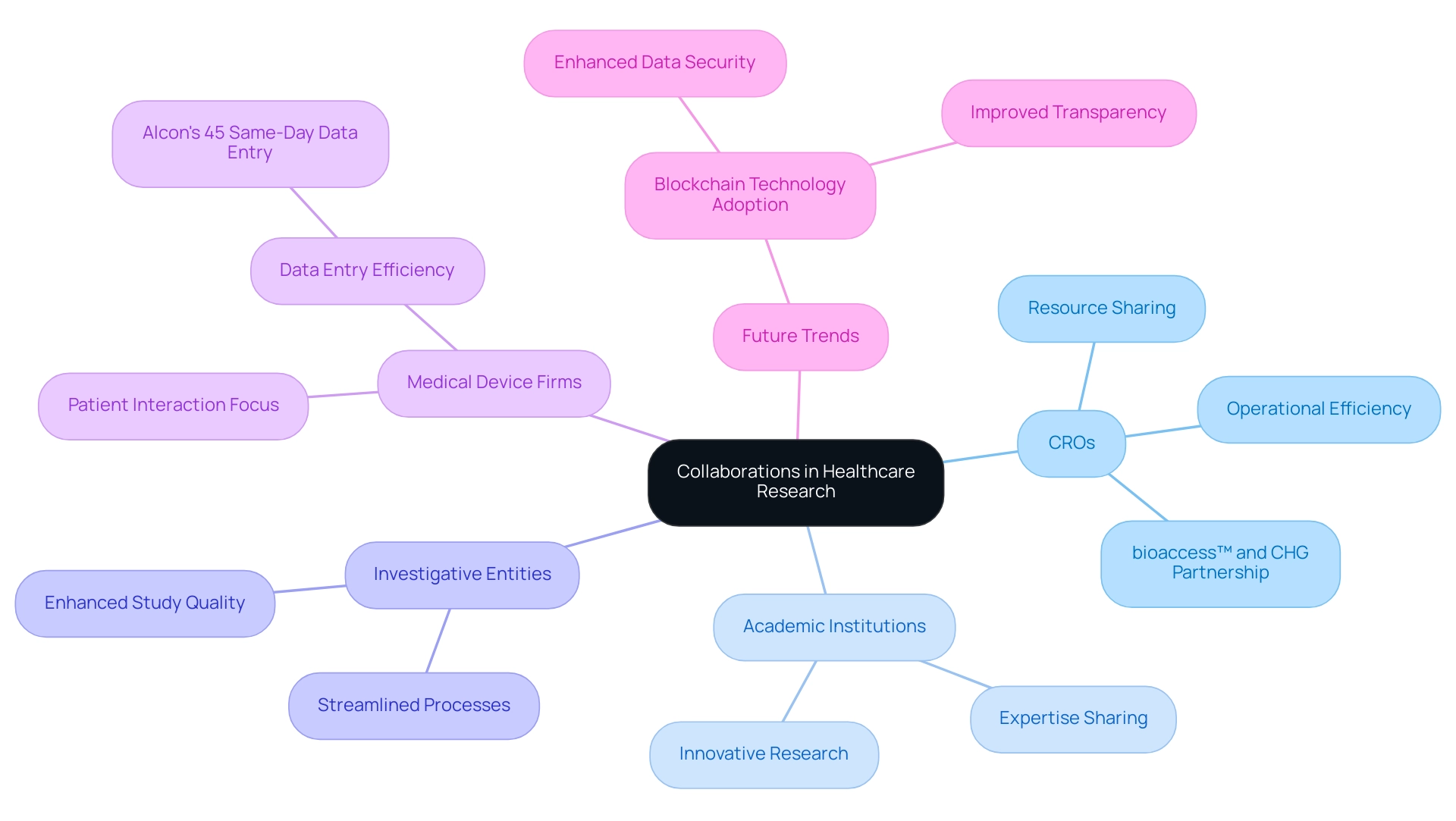
Future Perspectives: Innovations Driving Cost Savings in Clinical Research
The terrain of medical exploration in Latin America is on the cusp of a significant transformation, driven by advanced technologies and innovative approaches. The integration of artificial intelligence (AI), machine learning, and blockchain is set to revolutionize testing processes, enhance data management, and elevate patient engagement. For instance, AI-powered recruitment tools can drastically cut the time and costs associated with participant enrollment, addressing the estimated 54,000 queries annually that could be mitigated through improved system functionality. This streamlining of operations not only enhances participant experiences but also optimizes overall efficiency.
As we look toward 2025, the focus on innovations that deliver cost savings in Latin American research is more crucial than ever. Experts assert that the adoption of AI and machine learning not only streamlines operations but also enhances the quality of data collected, leading to more efficient research studies. The oncology sector, which commands the largest share of the research market, exemplifies this trend; the rising incidence of cancer drives a high volume of interventional studies aimed at developing effective therapies.
This growth is significantly shaped by technological innovations that bolster efficiency and data accuracy. Furthermore, the recent FDA draft guidance on Diversity Action Plans underscores the importance of incorporating diverse patient groups in research studies, which can further refine data processing and analysis. As noted by the Head of Clinical Data Engineering, "Traditionally, data management was outsourced to our CRO vendor partners. Part of the initiative is to bring all our studies in-house so that our internal teams can start working on it. They can be more hands-on, and we operationalize studies in-house and we are able to take control of our data, and we deliver for our patients with high quality." This shift not only enhances data quality but also improves patient onboarding and visit options, expanding participant pools in research studies.
Moreover, bioaccess™ is actively facilitating this transformation through its comprehensive research study management services, including feasibility assessments, site selection, compliance evaluations, study setup, import permits, project management, and reporting. The partnership between bioaccess™ and Caribbean Health Group aims to position Barranquilla as a premier research location in South America, with support from Colombia's Minister of Health. This collaboration is anticipated to yield significant economic benefits, including job creation and enhancements in healthcare within the region.
As these technologies continue to evolve, their impact on clinical trials in Latin America will be profound, paving the way for more effective research outcomes and underscoring the critical need for cost savings in Latin American research.
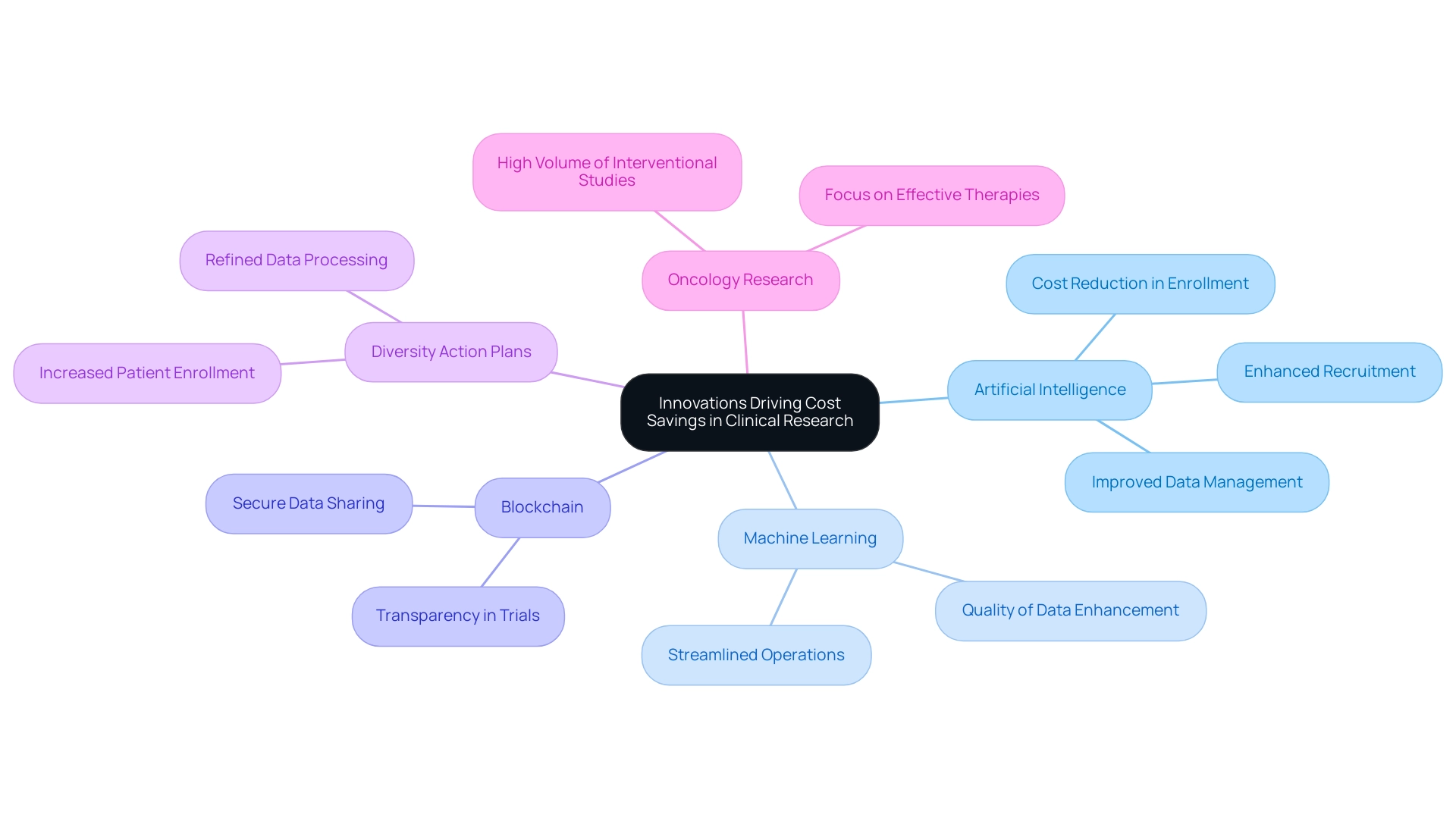
Conclusion
The clinical research landscape in Latin America represents a compelling opportunity for Medtech companies, driven by significant cost savings and enhanced efficiency. By leveraging lower labor costs, streamlined regulatory processes, and innovative collaborations with local CROs, organizations can achieve savings often exceeding 30% compared to North America and Europe. Partnerships forged between CROs like bioaccess® and local entities have proven instrumental in optimizing research budgets and facilitating access to diverse patient populations, which is crucial for successful clinical outcomes.
As the region continues to evolve, advancements in infrastructure and technology further strengthen the capabilities of CROs, making them vital partners in global clinical research. The implementation of patient-centric strategies and decentralized clinical trials enhances recruitment and retention rates, ultimately driving down operational costs. Additionally, ongoing regulatory advancements streamline approval processes, ensuring that innovative medical devices can reach the market more swiftly.
Looking ahead, the integration of cutting-edge technologies such as AI and blockchain is poised to revolutionize clinical trials in Latin America, improving data management and participant engagement. This technological shift, combined with the region's commitment to fostering collaborative networks, positions Latin America as a leader in efficient, cost-effective clinical research.
In summary, for Medtech companies aiming to maximize their research budgets while maintaining high-quality outcomes, Latin America stands out as a strategic destination. The synergy of cost-effectiveness, infrastructure development, and innovative methodologies underscores the potential for this region to become a hub for clinical trials, ultimately benefiting both the global healthcare landscape and local economies.
Frequently Asked Questions
What are the main cost-saving factors for conducting research in Latin America, particularly South America?
The main cost-saving factors include reduced labor costs, lower operational expenses, and more streamlined regulatory processes.
How much can cost savings exceed when conducting medical studies in South America?
Cost savings can exceed 30% when conducting medical studies in South America.
What are the patient recruitment costs for medical studies in South America in 2025?
Patient recruitment costs range from $15,000 to $50,000 in 2025.
How do partnerships with local contract research organizations (CROs) benefit Medtech companies?
Partnerships with local CROs, such as bioaccess®, enhance financial resources and provide access to diverse patient populations, which are crucial for achieving robust health outcomes and realizing cost savings.
What role does infrastructure and technology play in the cost savings of research in Latin America?
Advancements in infrastructure and technology bolster the capabilities of CROs, establishing them as vital partners in global research trials, thus contributing to cost savings.
What specific types of studies does bioaccess® manage?
Bioaccess® manages a variety of studies, including Early-Feasibility, First-In-Human, Pilot, Pivotal, and Post-Market Follow-Up Studies.
How have Brazil and Mexico contributed to enhancing the healthcare investigation infrastructure?
Brazil and Mexico have directed significant investments into developing specialized centers and refining regulatory frameworks, leading to improved quality of research studies and cost savings.
What legislative changes in Brazil have impacted the approval process for medical studies?
Brazil has implemented new laws designed to simplify the approval procedure for medical studies, enabling faster commencement of investigative activities.
What improvements have been noted from partnerships in recruitment and retention for studies in Latin America?
Partnerships have shown substantial decreases in recruitment durations and improved retention rates, with one partnership achieving over a 50% reduction in recruitment time and 95% retention rates.
What is the future outlook for medical research in Latin America by 2025?
The future of medical research in Latin America appears promising, with aspirations of becoming a prominent center for studies by 2025, driven by economic impacts such as job creation and healthcare improvements.

